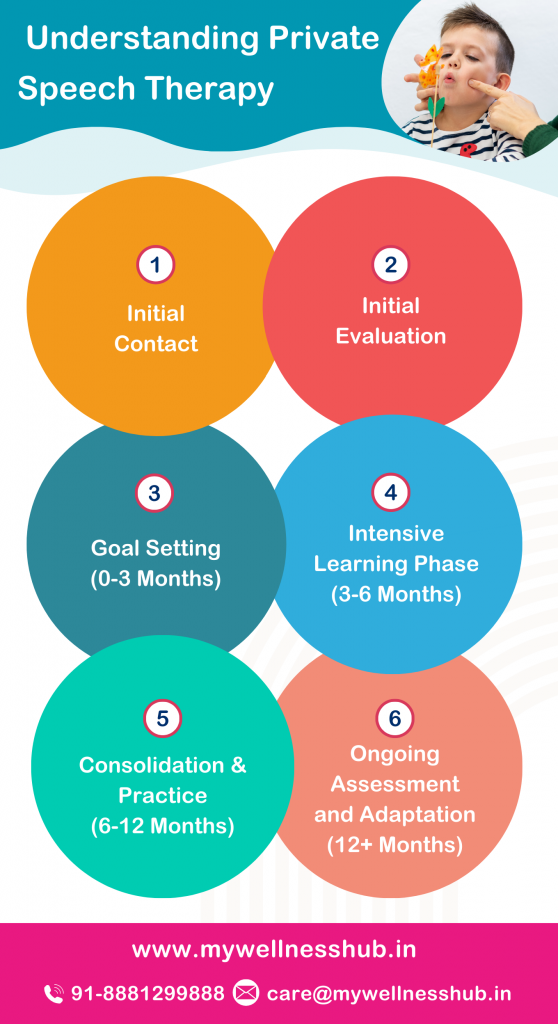Private Speech Therapy: Unlocking Your Child’s Speech Potential
By Rajini D
Last Updated: March 23, 2024
In the wonderful journey of growing up, being able to talk and communicate well is super important. It’s like a bridge that helps kids connect with the big world around them. Think about how happy children feel when they say their first words, or when they can put sentences together to tell a story, or how proud they feel when they can say what they need or think. These big steps in learning to talk are very important for kids as they grow. They help kids make friends, do well in school, and have good chats with everyone around them.
However, not all paths to communication are paved smoothly. Some children find themselves facing hurdles that make these steps challenging. This is where the magic of speech therapy comes into play, acting as a guiding light for families navigating these waters. Speech therapy isn’t just about correcting pronunciation or expanding vocabularies; it’s a holistic approach designed to unlock each child’s potential to communicate confidently and effectively.
Through personalized strategies and dedicated support, speech therapists embark on a mission to transform lives—one word at a time. Whether it’s helping a toddler pronounce their first words, assisting a child in overcoming stuttering, or supporting a young learner in understanding and using language effectively, the role of speech therapy is monumental. It’s a journey of growth, confidence, and connection.
Also Read: The Early Years of Speech and Language
Understanding the Impact of Private Speech Therapy
Private speech therapy is a special journey made just for your child. It’s not like the usual help you might find in schools or public places, where everyone gets the same kind of help. In private therapy, everything is about what your child needs. It’s like having a helper who makes sure every meeting helps your child get better at talking and understanding in their own special way. This is really important for kids who might not do well with the usual help that tries to fit everyone.
The Power of One-on-One Attention
Private speech therapy is all about giving each child special attention. In these sessions, the therapist can spend all their time just on one child, really getting to know what makes them unique. This helps the therapist and the child understand each other better. Plus, the therapist can change how they teach right at the moment to make sure every lesson is really helping and is fun, too.
Aligning Therapy with Interests
Private speech therapy also offers something special that you don’t often find in public places: it can be customized just for your child. Therapists can make each session fit what your child likes, making learning not just useful but fun, too. When therapy matches a child’s own interests, it really helps them get involved and enjoy it. This is a big part of what makes speech therapy work so well.
Comparing Private and School-Based Therapy
In school therapy, therapists have a lot of kids to help and not much time for each one. But in private therapy, it’s different. Each session is just for one child. This means the therapist can spend all their time on what that child needs. It’s a special chance that kids don’t always get in school.
Growth Beyond Communication Skills
As we learn more about private speech therapy, we see how much it can really help a child grow. This kind of therapy gives kids the special attention and help they need. It does more than just help with talking problems. It also builds up a child’s confidence, making them feel good about speaking up and sharing their thoughts.
The Key Benefits of Choosing Private Speech Therapy
Individualized Attention and Customized Plans
Imagine a world where learning and therapy are all about what each child needs and dreams about. This is what private speech therapy is like. It’s a special kind of help where each session is just for one child, focusing on what they’re good at and what they find hard. The plans made for them change as they get better or as their goals change. This way, every child gets to improve their speaking skills in their own time and in their own special way.
Family Involvement and Empowerment
The role of family in helping a child grow is really important, especially when it comes to speech therapy. In private speech therapy, it’s great when parents and caregivers get involved. Instead of just watching, they join in the therapy process. This teamwork is more than helpful—it changes things for the better. When families learn how to help their child’s talking and understanding skills at home, the good effects of therapy keep going even after the sessions end. This speeds up progress and makes sure learning sticks in the places where kids spend most of their time. This teamwork doesn’t just help the kids; it makes families feel stronger and supported together.
Explore our strategies on tips for parenting an autistic child for practical insights.
Flexibility and Comfort
In today’s busy world, being able to choose when to have therapy sessions that fit your family’s schedule is a big help. Private speech therapy is great because it lets you do this. It means you can get support when you need it most without worrying about strict schedules. Plus, having therapy in a place that feels safe and familiar, like home, a private office, or online, can make learning better for kids. When kids feel comfortable, they’re more willing to join in, share their thoughts, and enjoy learning. This comfort helps them feel secure, which is important for building good speaking skills.
At Wellness Hub, we’re all about helping families communicate better. We’re here to work with you, offering the kind of help, choices, and personal care that really make a difference.
Learn more about early identification and warning signs in child development to stay proactive in your child’s communication growth.
The Transformative Effects on Children’s Growth
Speech and Language Development
Private speech therapy is really good at finding and helping with the exact problems a child might have with talking. These special therapy sessions work on making speech clearer, growing the child’s word bank, and helping them understand language better. This special plan means each child gets just the help they need to get better at communicating. As children start to speak more clearly and understand language better, they find it easier to join in conversations, share their thoughts, and understand more about the world. This big step in talking opens up lots of chances for learning and making friends, helping them do well in school and feel happy.
Social Skills and Confidence
The impact of private speech therapy extends far beyond the mechanics of speech and language; it reaches into the very essence of a child’s social being. As children become more adept communicators, they navigate social interactions with increased ease and confidence. The ability to express oneself clearly and understand others fosters a sense of belonging and connection. Children who once might have shied away from group activities or conversations find themselves participating eagerly, contributing ideas, and forming meaningful relationships. This newfound confidence does not just illuminate their social lives; it shines through every aspect of their being, empowering them to tackle challenges, seize opportunities, and voice their thoughts and feelings with conviction.
Making the Decision for Your Child
Deciding on private speech therapy for your child is a significant step towards supporting their communication journey. This decision, influenced by various factors, paves the way for personalized support tailored to your child’s unique needs.
Evaluating the Need for Private Speech Therapy
- Observe Your Child’s Communication Skills: Start by observing how your child communicates in different settings. Are there noticeable struggles with speech clarity, language use, or social interaction? These observations can serve as initial indicators of the need for professional assessment.
- Seek Professional Evaluation: A comprehensive evaluation by a speech-language pathologist (SLP) is crucial. This assessment will give you a clear understanding of your child’s speech and language abilities and any areas that require support.
- Consider Your Child’s Environment: Reflect on whether your child’s current environment (e.g., school or community services) provides the level of support needed. Private speech therapy might offer more personalized attention and tailored interventions.
Factors to Consider
- Individualized Attention: One of the core strengths of private speech therapy is the one-on-one focus it provides. Consider whether your child would benefit more from individualized sessions than group settings.
- Family Involvement: Private speech therapy often allows for greater parent and caregiver involvement. This is key for reinforcing strategies at home and fostering progress.
- Scheduling Flexibility: Private therapy can often accommodate your scheduling needs more easily, providing sessions outside of regular school or work hours.
- Specialized Expertise: If your child has specific speech or language challenges, finding a therapist with expertise in that area can be more straightforward in a private setting.

What to Expect: Private Speech Therapy Timeline
| Timeframe | Focus Area | Expected Outcome |
|---|---|---|
| 0-3 Months | Assessment & Baseline | The initial phase involves comprehensive assessment to understand the child’s current speech and language abilities. Speech-language pathologists (SLPs) will evaluate the child’s communication skills to establish a baseline. Goals for therapy are set based on these assessments, taking into account the child’s specific needs and challenges. |
| 3-6 Months | Intensive Learning | During this phase, children undergo intensive learning through targeted speech therapy sessions. These sessions are designed to address the specific areas identified during the assessment phase. Parents can expect to see noticeable improvements in areas such as speech clarity, vocabulary development, and understanding and use of language. The therapy is hands-on, with various activities and exercises aimed at enhancing the child’s speech and language skills. |
| 6-12 Months | Consolidation & Practice | After the initial intensive learning period, the focus shifts to consolidating those new skills and practicing them in various settings. The expected outcome is for the child to begin applying their improved communication skills in everyday situations, such as at home, in school, or during play with peers. This phase is crucial for reinforcing what has been learned and ensuring that the child can effectively use their skills in real-life contexts. |
| 12+ Months | Review & Adaptation | Beyond the first year, therapy sessions focus on reviewing the child’s progress and adapting goals as needed. Depending on the child’s development, advanced objectives may be set to continue supporting their growth. This phase is characterized by ongoing assessment and tailoring of therapy to meet the evolving needs of the child. It ensures that the child continues to receive support in mastering complex language and communication skills, preparing them for future academic and social success. |
For a closer look at setting and achieving developmental milestones, our article on speech and language milestones for different ages offers valuable benchmarks.
Getting Started with Private Speech Therapy
- Research Qualified Therapists: Look for licensed speech-language pathologists with experience in treating children with similar needs as your child. Websites like Wellness Hub offer directories and resources to help you start your search.
- Insurance and Costs: Consider the cost of therapy and check whether your insurance provides coverage for private speech therapy. Many therapists offer payment plans or sliding scale fees to make services more accessible.
- Prepare Your Child: Once you’ve decided to proceed with private speech therapy, prepare your child by explaining what to expect in a way that’s reassuring and positive. Highlight the fun aspects, like games and activities, to build enthusiasm.
- Ongoing Communication with the Therapist: Establishing open lines of communication with your child’s speech therapist is crucial. Regular updates and feedback sessions can help you understand your child’s progress and how you can support them at home.
At Wellness Hub, we understand the importance of this decision and are here to support you with resources, guidance, and access to expert care, ensuring that your child’s journey toward effective communication is filled with support, progress, and positive experiences.
Read more: Navigating Online Speech Therapy Across Ages: A Guide for All
Conclusion
As we wrap up our journey into the world of private speech therapy, it’s clear this path is about so much more than just improving how a child speaks. It’s about helping them reach their full potential. Private speech therapy gives children the confidence to share their thoughts and feelings and supports them as they grow. This special kind of therapy focuses on what each child needs, making a big difference in their lives. It helps them now and prepares them for a brighter future by improving their social skills, doing well in school, and feeling good about themselves.
Thinking about private speech therapy for your child? See it as a way to invest in their future. Helping your child communicate better opens up many opportunities for them. It’s a gift that will help them throughout their life. As you consider this step, remember you’re not alone. Wellness Hub is here to help, offering the support and expert advice you need. Together, we can start a journey that helps your child grow, gain confidence, and embrace a world filled with possibilities.
Frequently Asked Questions:
1. What is private speech therapy, and how does it differ from public speech therapy?
Private speech therapy offers personalized, one-on-one sessions tailored to a child’s specific needs, focusing on improving communication skills in a nurturing environment. Unlike public speech therapy, which might take place in group settings or within limited school resources, private therapy allows for flexible scheduling and involves parents more directly in the process.
2. How can private speech therapy benefit my child?
Private speech therapy provides individualized attention, helping children improve speech clarity, language comprehension, and social interaction. It empowers kids to communicate effectively, boosting their confidence and academic performance.
3. When should I consider private speech therapy for my child?
Consider private speech therapy if your child struggles with speech clarity, language use, or social skills, or if they’re not making expected progress in a group or school setting. An evaluation by a licensed speech-language pathologist can help determine if private therapy is a good fit.
4. What factors should I consider when choosing private speech therapy?
Look for licensed therapists with experience relevant to your child’s needs, consider the flexibility of scheduling, and ensure the approach includes family involvement. Also, think about the therapy’s location and whether your insurance covers the cost.
5. How can I get started with private speech therapy for my child?
Start by consulting a speech-language pathologist for an evaluation. Research therapists who specialize in working with children and check their qualifications. Wellness Hub can help connect you with resources and professionals to start your child’s journey toward effective communication.
6. Can private speech therapy really make a difference in my child’s future?
Absolutely. Improving communication skills through private speech therapy not only helps with current challenges but also lays the foundation for future success in personal, academic, and eventually, professional settings. It’s an investment in your child’s ability to express themselves and engage with the world around them confidently.
7. Is private speech therapy covered by insurance?
Coverage for private speech therapy varies by insurance plan. Some plans cover therapy when deemed medically necessary, while others might have limitations. It’s important to check with your insurance provider to understand your coverage, including any deductibles or copays. Wellness Hub can also offer guidance on navigating payment and insurance options.
8. How long does a child typically need to attend private speech therapy?
The duration of private speech therapy depends on the child’s individual needs, the goals set by the therapist and family, and how the child progresses over time. Therapy could range from a few months to a couple of years, with regular assessments to monitor progress and adjust goals as needed.
9. Can private speech therapy help with more than just speech?
Yes, private speech therapy also addresses language comprehension, social communication skills, and other related areas. It can help with understanding and using language effectively, improving reading skills, and teaching strategies for better social interaction and emotional regulation.
10. How involved are parents in the private speech therapy process?
Parent involvement is a key component of private speech therapy. Therapists often provide strategies and activities for parents to practice with their child at home, enhancing the therapy’s effectiveness. Regular updates and sessions may include parent training to support their child’s communication development in daily life.
About the Author:
Rajini Darugupally
M.Sc., Speech-Language Pathologist (9+ years of experience)
Rajini is a passionate and dedicated Speech-Language Pathologist with over 9+ years of experience, specializing in both developmental speech and language disorders in children and rehabilitation in adults. Driven by a desire to empower each individual to find their voice, Rajini brings a wealth of experience and a warm, genuine approach to therapy.
Currently, at Wellness Hub, she thrives in a team environment that values innovation, compassion, and achieving results for their clients.
Connect with Rajini to learn more about how she can help you or your loved one find their voice.
Book your Free Consultation Today
Parent/Caregiver Info:
Client’s Details:
* Error Message








